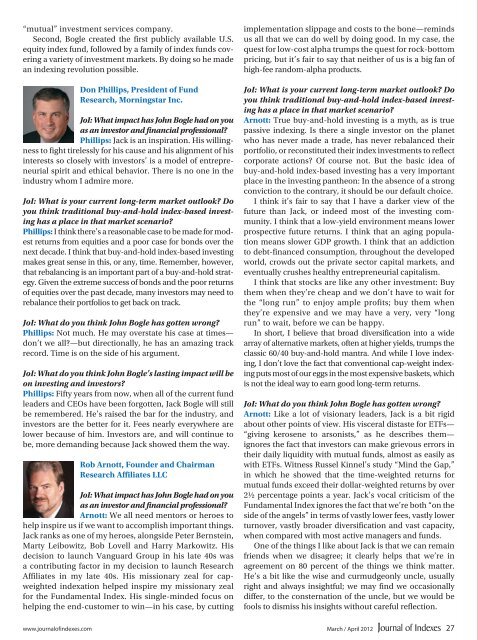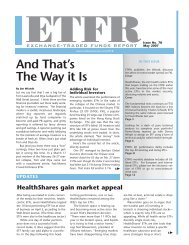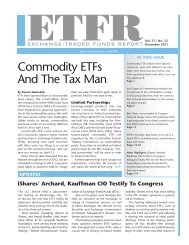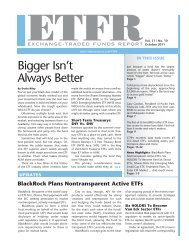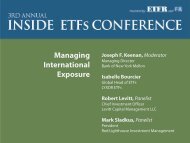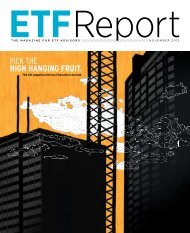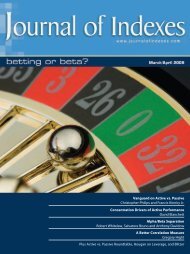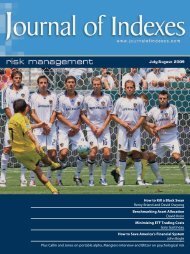Create successful ePaper yourself
Turn your PDF publications into a flip-book with our unique Google optimized e-Paper software.
“mutual” investment services <strong>com</strong>pany.<br />
Second, Bogle created <strong>the</strong> first publicly available U.S.<br />
equity index fund, followed by a family of index funds covering<br />
a variety of investment markets. By doing so he made<br />
an indexing revolution possible.<br />
Don Phillips, President of Fund<br />
Research, Morningstar Inc.<br />
JoI: What impact has John Bogle had on you<br />
as an investor and financial professional?<br />
Phillips: Jack is an inspiration. His willingness<br />
to fight tirelessly for his cause and his alignment of his<br />
interests so closely with investors’ is a model of entrepreneurial<br />
spirit and ethical behavior. There is no one in <strong>the</strong><br />
industry whom I admire more.<br />
JoI: What is your current long-term market outlook? Do<br />
you think traditional buy-and-hold index-based investing<br />
has a place in that market scenario?<br />
Phillips: I think <strong>the</strong>re’s a reasonable case to be made for modest<br />
returns from equities and a poor case for bonds over <strong>the</strong><br />
next decade. I think that buy-and-hold index-based investing<br />
makes great sense in this, or any, time. Remember, however,<br />
that rebalancing is an important part of a buy-and-hold strategy.<br />
Given <strong>the</strong> extreme success of bonds and <strong>the</strong> poor returns<br />
of equities over <strong>the</strong> past decade, many investors may need to<br />
rebalance <strong>the</strong>ir portfolios to get back on track.<br />
JoI: What do you think John Bogle has gotten wrong?<br />
Phillips: Not much. He may overstate his case at times—<br />
don’t we all?—but directionally, he has an amazing track<br />
record. Time is on <strong>the</strong> side of his argument.<br />
JoI: What do you think John Bogle’s lasting impact will be<br />
on investing and investors?<br />
Phillips: Fifty years from now, when all of <strong>the</strong> current fund<br />
leaders and CEOs have been forgotten, Jack Bogle will still<br />
be remembered. He’s raised <strong>the</strong> bar for <strong>the</strong> industry, and<br />
investors are <strong>the</strong> better for it. Fees nearly everywhere are<br />
lower because of him. Investors are, and will continue to<br />
be, more demanding because Jack showed <strong>the</strong>m <strong>the</strong> way.<br />
Rob Arnott, Founder and Chairman<br />
Research Affiliates LLC<br />
JoI: What impact has John Bogle had on you<br />
as an investor and financial professional?<br />
Arnott: We all need mentors or heroes to<br />
help inspire us if we want to ac<strong>com</strong>plish important things.<br />
Jack ranks as one of my heroes, alongside Peter Bernstein,<br />
Marty Leibowitz, Bob Lovell and Harry Markowitz. His<br />
decision to launch Vanguard Group in his late 40s was<br />
a contributing factor in my decision to launch Research<br />
Affiliates in my late 40s. His missionary zeal for capweighted<br />
indexation helped inspire my missionary zeal<br />
for <strong>the</strong> Fundamental Index. His single-minded focus on<br />
helping <strong>the</strong> end-customer to win—in his case, by cutting<br />
implementation slippage and costs to <strong>the</strong> bone—reminds<br />
us all that we can do well by doing good. In my case, <strong>the</strong><br />
quest for low-cost alpha trumps <strong>the</strong> quest for rock-bottom<br />
pricing, but it’s fair to say that nei<strong>the</strong>r of us is a big fan of<br />
high-fee random-alpha products.<br />
JoI: What is your current long-term market outlook? Do<br />
you think traditional buy-and-hold index-based investing<br />
has a place in that market scenario?<br />
Arnott: True buy-and-hold investing is a myth, as is true<br />
passive indexing. Is <strong>the</strong>re a single investor on <strong>the</strong> planet<br />
who has never made a trade, has never rebalanced <strong>the</strong>ir<br />
portfolio, or reconstituted <strong>the</strong>ir index investments to reflect<br />
corporate actions? Of course not. But <strong>the</strong> basic idea of<br />
buy-and-hold index-based investing has a very important<br />
place in <strong>the</strong> investing pan<strong>the</strong>on: In <strong>the</strong> absence of a strong<br />
conviction to <strong>the</strong> contrary, it should be our default choice.<br />
I think it’s fair to say that I have a darker view of <strong>the</strong><br />
future than Jack, or indeed most of <strong>the</strong> investing <strong>com</strong>munity.<br />
I think that a low-yield environment means lower<br />
prospective future returns. I think that an aging population<br />
means slower GDP growth. I think that an addiction<br />
to debt-financed consumption, throughout <strong>the</strong> developed<br />
world, crowds out <strong>the</strong> private sector capital markets, and<br />
eventually crushes healthy entrepreneurial capitalism.<br />
I think that stocks are like any o<strong>the</strong>r investment: Buy<br />
<strong>the</strong>m when <strong>the</strong>y’re cheap and we don’t have to wait for<br />
<strong>the</strong> “long run” to enjoy ample profits; buy <strong>the</strong>m when<br />
<strong>the</strong>y’re expensive and we may have a very, very “long<br />
run” to wait, before we can be happy.<br />
In short, I believe that broad diversification into a wide<br />
array of alternative markets, often at higher yields, trumps <strong>the</strong><br />
classic 60/40 buy-and-hold mantra. And while I love indexing,<br />
I don’t love <strong>the</strong> fact that conventional cap-weight indexing<br />
puts most of our eggs in <strong>the</strong> most expensive baskets, which<br />
is not <strong>the</strong> ideal way to earn good long-term returns.<br />
JoI: What do you think John Bogle has gotten wrong?<br />
Arnott: Like a lot of visionary leaders, Jack is a bit rigid<br />
about o<strong>the</strong>r points of view. His visceral distaste for ETFs—<br />
“giving kerosene to arsonists,” as he describes <strong>the</strong>m—<br />
ignores <strong>the</strong> fact that investors can make grievous errors in<br />
<strong>the</strong>ir daily liquidity with mutual funds, almost as easily as<br />
with ETFs. Witness Russel Kinnel’s study “Mind <strong>the</strong> Gap,”<br />
in which he showed that <strong>the</strong> time-weighted returns for<br />
mutual funds exceed <strong>the</strong>ir dollar-weighted returns by over<br />
2½ percentage points a year. Jack’s vocal criticism of <strong>the</strong><br />
Fundamental Index ignores <strong>the</strong> fact that we’re both “on <strong>the</strong><br />
side of <strong>the</strong> angels” in terms of vastly lower fees, vastly lower<br />
turnover, vastly broader diversification and vast capacity,<br />
when <strong>com</strong>pared with most active managers and funds.<br />
One of <strong>the</strong> things I like about Jack is that we can remain<br />
friends when we disagree; it clearly helps that we’re in<br />
agreement on 80 percent of <strong>the</strong> things we think matter.<br />
He’s a bit like <strong>the</strong> wise and curmudgeonly uncle, usually<br />
right and always insightful; we may find we occasionally<br />
differ, to <strong>the</strong> consternation of <strong>the</strong> uncle, but we would be<br />
fools to dismiss his insights without careful reflection.<br />
www.journalofindexes.<strong>com</strong> March / April 2012 27


